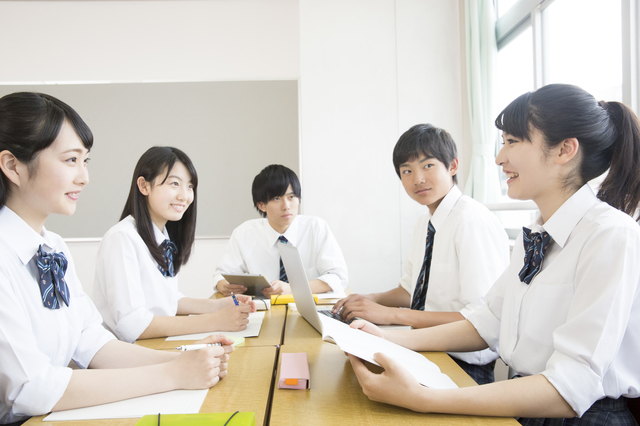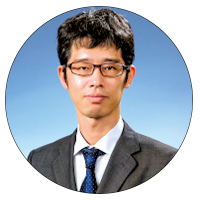Now, the time has finally come to set the theme for the research activity.At the school of Mr. A, a second-year high school student, first-year students do individual research and second-year students do group research. ``Even though I said, ``You can choose your own theme,'' the only things I like are games and club activities, so I'm at a loss...'' Which faculty should I choose? I have entrance exams next year, so I have to make a decision already, but I can't even imagine what faculty or future job I will choose."
It seems quite difficult to decide on a theme based on such a situation. Even when several students like Mr. A gather in a group, none of them have anything they want to do, so no progress is made in setting a theme.How should I proceed?

Theme setting begins “before you even begin”
Is it possible for a topic to explore to pop out from a blank slate in your head?Even if it comes out, wouldn't it be just a whim?In fact, advance preparation is important in setting a good theme.Support from schools, parents, and local governments is also needed so that high school students can have contact with the ``adult world.''
The most effective is experiential activities.Some students find themes for their research activities through hands-on activities offered by school or outside organizations.If it is difficult to go to the site, one way is to invite working adults as lecturers.
However, preparing for hands-on activities places a heavy burden on schools.In the first place, it is impossible to cover experiential activities for every possible theme.What should I do?
Let's read a book
Books are the most important medium for obtaining information about the adult world.In the world of books, you can freely travel to far away countries, the past and the future, and even to places outside the Earth.
If you just want to get an idea, it's not a bad idea to start with videos on the internet.Nowadays, there is a lot of high quality content on YouTube etc.Still, I want you to read the book.Most of the knowledge that can be obtained from videos and articles on the internet is short "fragments".On the other hand, from books you can obtain knowledge that is systematized and has a logical flow.It is such knowledge that is truly useful in inquiry activities.Books are the most efficient way to acquire such knowledge.
Furthermore, regardless of research or work, the most important information in the ``adult world'' is always recorded and transmitted as written information.Developing reading and writing skills and an attitude of becoming familiar with knowledge through books should be emphasized not only in inquiry activities but in all aspects of school education.
However, high school students (and adults?) don't seem to read much. According to a survey by the National School Library Council, high school students will be reading an average of 2022 books per month by 1.6.This is an overwhelmingly small number compared to 13.2 books for elementary school students and 4.7 books for junior high school students.I suspect that the transition from children's books to adult reading is not progressing well.In my on-site exploration classes, I recommend new books, but we have to start by asking ourselves, ``What is a new book?What kind of book is it in?''In order to support research activities, there is a need for an enriched reading environment and support in both the public and private sectors.

Narrow down your theme
In any case, form groups of students with similar themes.As an example, let's say a group of students who are interested in medicine gather together. Mr. A is aiming to become a doctor and seems to be interested in the mechanism of genes. Mr. B, on the other hand, is worried about whether he will be able to continue receiving medical care in his hometown, which is undergoing depopulation. Mr. C is obsessed with club basketball, but became interested in sports rehabilitation after suffering an injury. The three of us have very different interests and motivations, but since this is a group study, we need to set a common research topic (theme).The following three are the basic conditions.
(1) Are you interested and willing to work on it?
Motivation is the most important factor in pursuing research activities.An unmotivated exploration will not progress at all, nor will it be interesting.On the other hand, if the topic is something that they are excited about, the students will move forward on their own.
In the case of group research, each member has different interests, concerns, and interests.We need to find a compromise that everyone can agree on.
(2) Is it socially and academically valuable and appropriate as an inquiry activity for high school students?
High school students who lack social experience are indifferent to the position and significance of their topics in society.There is also no incentive to have that sense of purpose.This is very different from research by researchers or projects by local governments or companies.I believe that having students choose a meaningful theme depends on how much contact they can make with the outside world.This is because the incentive to add social and academic value to a research topic naturally arises within society and academia.
(3) Can it be carried out within the framework of "time for comprehensive inquiry"?
Every project has time, financial, ability, and geographic constraints, but high school students' research activities have many constraints.In most cases, the activity time is XNUMX to XNUMX hours per week, and the budget is small.Fieldwork and visits to external institutions are limited to nearby areas, assuming that they are conducted during class hours.We have to think about what we can do under these constraints.
Technology to generate ideas
Setting a theme for an inquiry activity is the task of finding an extremely narrow overlap between items (1) to (3) above.What do we really want to know, and what value does our efforts have?What kind of situation are we in?It is by no means easy to understand these clearly and find overlap.It's not always easy for researchers either.You are required to have the inspiration to find an auxiliary line for a geometrical problem.
In this way, for the first time, high school students face the ``birth pains'' of narrowing down a theme. Time passes with the frustration of not knowing what to do and not being able to decide on a theme.No wonder students are confused.What should I do?
Various "thinking tools" are now known, and many teaching materials introducing them have been developed, but I will leave their explanations to other experts.Here, I would like to introduce a more simple method that I have found to be actually effective in the field of research.
(1) Discuss on the board.
Discussion using a board (blackboard or whiteboard) is the most effective way to organize information and find a way forward. When you hear the word "research," you probably imagine sitting at a desk, reading materials, doing calculations, and writing sentences.Of course, such work is necessary.However, my impression of the theoretical physicists I interacted with during my research was that they were professionals who conversed on a board.New ideas emerge from discussions on the board.High school students will need some getting used to this.One member of the group becomes the presenter and writes on the board in words, shapes, formulas, or any other style.Other members are constantly proposing their opinions and deepening the discussion.
(2) Converse in an informal atmosphere.
Places like classrooms and conference rooms tend to have a formal atmosphere.Good ideas often come from conversations in relaxed, informal settings such as cafeterias and break rooms.It is not uncommon for a discussion to begin at lunchtime in the cafeteria, and for research to begin with what was written on a paper napkin.
(3) walk
Have you ever seen a scene in a movie or drama where a scientist or detective walks around a room thinking?In fact, many ideas come to mind when I walk.It seems better to watch the scenery outside rather than inside the room.If you keep asking yourself questions while walking, ideas may pop into your head.
Creating new value
``Creating new value'' is an important goal of comprehensive research time.Don't you think new things are kind of exciting?New releases from your favorite bands, youtubers, authors, and new products from Apple.We are excited because they deliver new value.The excitement, fun, and fulfillment you get when you become the creator and sender of such new value is incomparably wonderful.Setting a theme for research activities is the gateway to "creating new value."I hope that as many high school students as possible, as well as teachers and the local community, enjoy it.

Akita Prefectural Yokote High School Teacher
Masashi Zeze
Graduated from the Department of Physics, Faculty of Science, Hiroshima University.He completed the first half of the doctoral course at the Graduate School of Science, Osaka City University, withdrew from the second half of the doctoral course, and received his Ph.D. (Science).After working as a researcher at Kyoto University, Keio University, and Taiwan University, he has been a doctoral professor in Akita Prefecture since 2008. Akita Prefectural Yokote High School from 2020.His specialty is particle theory and string theory.He graduated from Hyogo Prefectural Ashiya High School.
